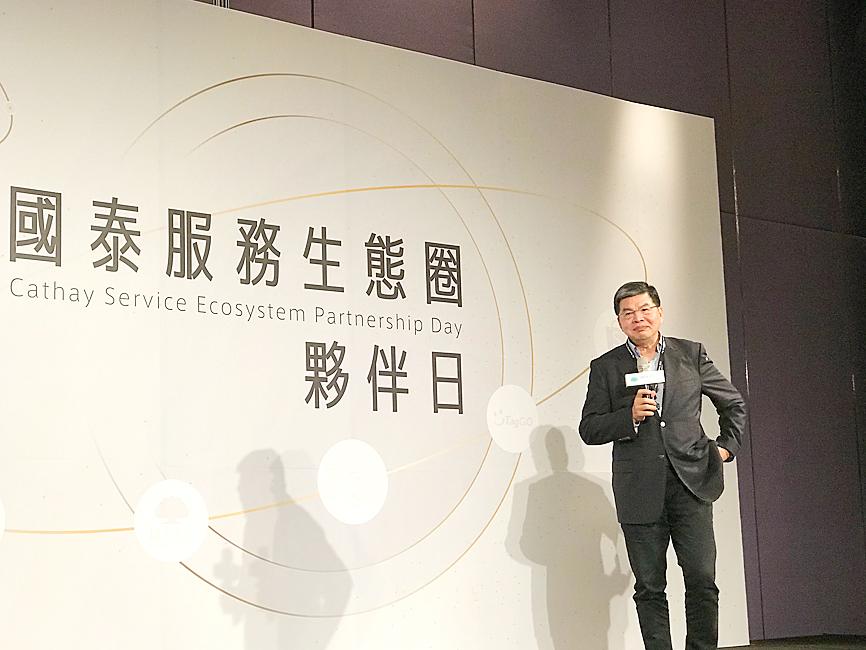The nation’s life insurance market might continue its downturn due to new regulations that took effect yesterday, but the market is expected to stabilize by the end of this year, Cathay Financial Holding Co (國泰金控) president Lee Chang-ken (李長庚) said yesterday in Taipei.
“It is foreseeable that sales of life insurance products would continue to fall in the short term as consumers are likely to purchase fewer policies after premiums went up,” Lee said at the Cathay Service Ecosystem Partnership Day.
“However, it seems to me that consumer demand for insurance products tends to be rigid and they might reconsider if they really need insurance products,” he said. “Nonetheless, insurance sales are expected to recover gradually.”

Photo: CNA
The new regulations would help the life insurance industry develop in a healthier way in the long term, he said.
Four new regulations took effect yesterday as the Financial Supervisory Commission (FSC) aims to boost life insurers’ financial solvency and prepare them for the implementation of new insurance contracts standard IFRS 17 in 2025.
The commission lowered life insurance companies’ liability reserve interest rates on all policies denominated in New Taiwan dollars and US dollars by 25 basis points and 50 basis points respectively to keep them in line with declining market rates.
The commission also set a new lower limit on the death benefit-to-policy value ratio, which would incentivize insurers to sell fewer savings plans or policies linked with wealth management, as they provide fewer death benefits.
Insurance companies must calculate the contractual service margins of their products and make sure the margins are positive when applying to the FSC.
Companies are also requested to adopt a mechanism to stabilize their products’ declared interest rates, which determine the bonuses that policyholders receive.

MULTIFACETED: A task force has analyzed possible scenarios and created responses to assist domestic industries in dealing with US tariffs, the economics minister said The Executive Yuan is tomorrow to announce countermeasures to US President Donald Trump’s planned reciprocal tariffs, although the details of the plan would not be made public until Monday next week, Minister of Economic Affairs J.W. Kuo (郭智輝) said yesterday. The Cabinet established an economic and trade task force in November last year to deal with US trade and tariff related issues, Kuo told reporters outside the legislature in Taipei. The task force has been analyzing and evaluating all kinds of scenarios to identify suitable responses and determine how best to assist domestic industries in managing the effects of Trump’s tariffs, he

TIGHT-LIPPED: UMC said it had no merger plans at the moment, after Nikkei Asia reported that the firm and GlobalFoundries were considering restarting merger talks United Microelectronics Corp (UMC, 聯電), the world’s No. 4 contract chipmaker, yesterday launched a new US$5 billion 12-inch chip factory in Singapore as part of its latest effort to diversify its manufacturing footprint amid growing geopolitical risks. The new factory, adjacent to UMC’s existing Singapore fab in the Pasir Res Wafer Fab Park, is scheduled to enter volume production next year, utilizing mature 22-nanometer and 28-nanometer process technologies, UMC said in a statement. The company plans to invest US$5 billion during the first phase of the new fab, which would have an installed capacity of 30,000 12-inch wafers per month, it said. The

Taiwan’s official purchasing managers’ index (PMI) last month rose 0.2 percentage points to 54.2, in a second consecutive month of expansion, thanks to front-loading demand intended to avoid potential US tariff hikes, the Chung-Hua Institution for Economic Research (CIER, 中華經濟研究院) said yesterday. While short-term demand appeared robust, uncertainties rose due to US President Donald Trump’s unpredictable trade policy, CIER president Lien Hsien-ming (連賢明) told a news conference in Taipei. Taiwan’s economy this year would be characterized by high-level fluctuations and the volatility would be wilder than most expect, Lien said Demand for electronics, particularly semiconductors, continues to benefit from US technology giants’ effort

‘SWASTICAR’: Tesla CEO Elon Musk’s close association with Donald Trump has prompted opponents to brand him a ‘Nazi’ and resulted in a dramatic drop in sales Demonstrators descended on Tesla Inc dealerships across the US, and in Europe and Canada on Saturday to protest company chief Elon Musk, who has amassed extraordinary power as a top adviser to US President Donald Trump. Waving signs with messages such as “Musk is stealing our money” and “Reclaim our country,” the protests largely took place peacefully following fiery episodes of vandalism on Tesla vehicles, dealerships and other facilities in recent weeks that US officials have denounced as terrorism. Hundreds rallied on Saturday outside the Tesla dealership in Manhattan. Some blasted Musk, the world’s richest man, while others demanded the shuttering of his